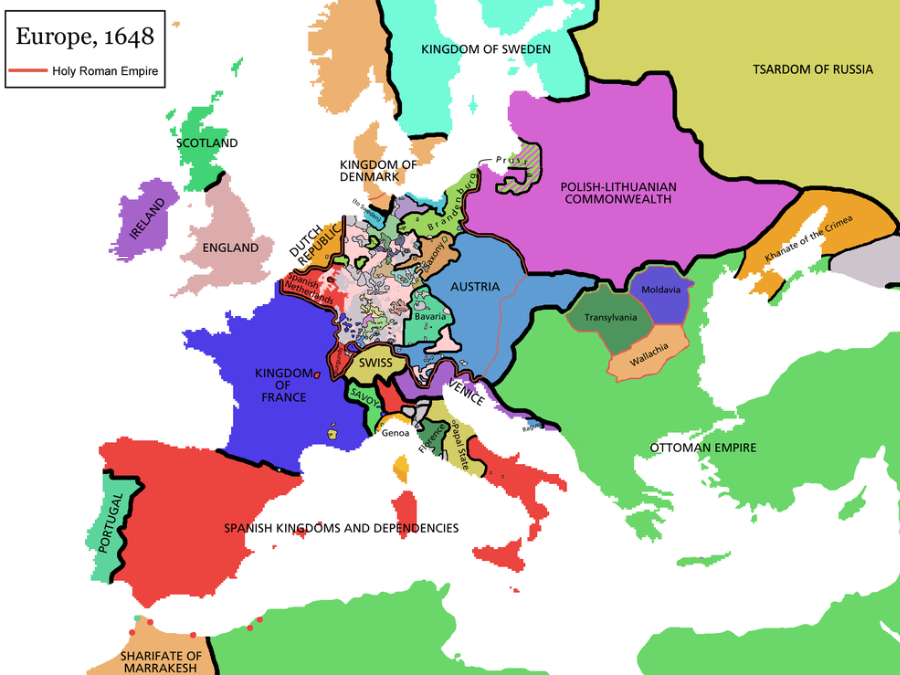
Martyn Percy: Lambeth Conferences and Calls – A Lessons Learned Review
July 29, 2022
War, religion and the nation state
August 15, 2022Greetings from the Trustees of Modern Church to everyone joining our conference, Living in Faith, Hope, and Love – Modern Church’s delayed response to the Church of England initiative, Living in Love and Faith [LLF]. Our conference was planned in 2018 for July 2020. The Trustees hoped to make a joyful, positive, affirmative theological contribution to the planned discussions, one worthy of the good news of Jesus Christ, in which all people whatsoever are welcomed and loved, and not merely told they are.
You all know that covid descended on us in March 2020, delaying our conference and interrupting the LLF process. In this short introduction I want to say something about LLF, and about the shape of the conference.
The History of LLF
Anglicans are weary of talking about sex. Getting some is a lot more interesting. Issues in Human Sexuality is more than thirty years old. Some Issues in Human Sexuality came out nearly twenty years ago. In between was the shocking Lambeth Conference of 1998. It said ‘homosexual practice’ (the coy euphemism Anglicans use for imagined but unspoken buggery) was incompatible with scripture. The Pilling Report is nearly a decade ago, recommending ‘facilitated conversations’ about what sexual relationships God was thought to like.
In 2017, the bishops received reports from the Shared Conversations, and produced a pusillanimous plan to do nothing, i.e., ‘proposing no change to ecclesiastical law or to the CofE’s existing doctrinal position on marriage and sexual relationships’. This abject failure of leadership was too much for the House of Clergy to stomach, so they kicked it out by voting not to take note of it (a euphemism for kicking it out), by 100 votes to 93. On 17th February 2017, the Archbishop of Canterbury hastily issued a statement conceding ‘we need a radical new Christian inclusion in the Church’. The bishops had also proposed a new ‘teaching document’. The Archbishops proposed a ‘Pastoral Advisory Group’ which would ‘advise dioceses on pastoral issues concerning human sexuality’, and these separate projects were later combined. LLF was the result.
Modern Church wanted to contribute to the discussions principally through its 2020 conference, and it is difficult to see now how we can contribute to what became a tightly managed and contested process, called ‘Listening to the Whole Church’ (the ‘whole church’, is of course the tiny Church of England). The College of Bishops will begin ‘the discernment process in the light of the LLF Book, the findings of ‘Listening to the Whole Church’ in September 22 and finalise proposals in December. In February 2023 (according to an updated page on the LLF website) General Synod will ‘Consider proposals from the College and House of Bishops and agree a clear direction of travel’. While this unholy prevarication was going on, the Church of Scotland, the Scottish Episcopal Church, and the Methodist Church have all voted to let ministers marry same-sex couples. The Governing Body of the Church in Wales now has a Rite of Blessing for them.
A Theological analysis of LLF
There are at least four broad themes which progressive, liberal, Christians are likely to find wanting: the approach to the Bible; the account of marriage; the treatment of gender; and the neglect of history. The conference is designed around each of these.
1. Bible
Despite the eirenic tone of the project the use of the Bible is controlled by firm conservative hands. There are countless examples of this. Genesis 1 – 3 is read as if it really all happened. Paul wrote all thirteen Letters attributed to him. 1 Corinthians is later than Mark! The fruits of 200 years’ critical scholarship are ignored. The Bible, or rather the conservative way of reading it is the problem, not the solution, and the conservative approach to it is taken to be normative. Complementarity and heteronormativity are protected, assumed and unchallenged. Who better then, to address the white, ideological theology that cannot accept bodies that are gay, and black than Jarel Robinson-Brown?
2. Marriage
Marriage is apparently an unproblematic and unchanging institution, even though Paul is lukewarm about it and Luke’s Jesus very much against it. The Bible is even said to have a single ‘view of marriage’. Because it is God’s licence for having straight sex, its hosting of violence – overt and covert – evade scrutiny. Its asymmetric character in every century is overlooked, and excused. Is there anyone who can write positively about marriage as a sacrament and a covenant, yet unpick the misuse of these terms and expose the latent violence in countless marriage, at the same time? There is, and she’s here. Rachel Starr will share some of the themes of her far-reaching book, Reimagining Theologies of Marriage in Contexts of Domestic Violence.
3. The Treatment of Trans People and of the idea of Gender
The welcome presence of trans people in church and world cannot be expressed by a superficial conservative theology that blithely assumes modern binaries – male/female, heterosexual/homosexual, masculine/feminine. Deep theological analysis of these binaries is needed, and no-one has done more to provide this than Susannah Cornwall. Tina Beardsley, herself a trans priest (who wrote about her resignation from the LLF process in the Church Times) will respond, and in a separate session provide a theological critique of current intellectual objections to trans people
The treatment of gender itself is unsatisfactory. LLF does not address a core meaning of gender, i.e., the relations between women and men. This allows it to ignore almost completely the asymmetrical character of relations between women and men throughout the Bible and the entire sweep of Church history. We have come to see how some theological ideas are intrinsically abusive when they license control and oppression, and there is no-one better to help us understand this than Johanna Stiebert.
4. The Neglect of History
LLF has little time for history or for tradition. A member of the History Working Group of LLF has commented on the steady exclusion of history from the production of the final text, until ‘the bland picture of nothing changing until the 1960s’ prevailed, a development which was ‘wrong, and dangerous’. She is here. That person is Helen King. Finally theological critique needs to address how science and society themselves have embodied ideas about sexuality and gender that do not contribute to human flourishing. I will say something about these in my session ‘A Theological Critique of (Sexual) Culture’.
The conference was designed to address theological weaknesses and omissions in the LLF project. Each speaker here was my first choice to address their subjects, and all of them said ‘Yes’ to the original invitations.
The Speakers
Professor Helen King is Professor Emerita of Classical Studies at the Open University. She represented the Oxford diocese on General Synod. She was a member of the History Thematic working Group of LLF. Her Modern Church blog (Nov. 2020) describes the virtual elimination of history from the production of LLF materials and the damage caused by its absence. She has written many distinguished books on classical medicine and the body in history – Hippocrates Now; Hippocrates’ Woman: Reading the Female Body in Ancient Greece; The One-Sex Body on Trial; and The Disease of Virgins: Green Sickness, Chlorosis and the Problems of Puberty (to mention some of them).
Professor Susannah Cornwall is Professor of Constructive Theologies in the Dept of theology and Religion in the University of Exeter. She was a member of the Theology Thematic Working Group of LLF. Her research on the pastoral and spiritual care of people undergoing transition is cited by the University of Exeter’s website as one of the University’s outstanding achievements in the last Research Excellence Framework. Her books include Sex and Uncertainty in the Body of Christ; Controversies in Queer Theology; Intersex, Theology, and the Bible; Theology and Sexuality; and Un/familiar Theology. What she shares with us today will appear in her next book, Constructive Theology and Gender Variance: Transformative Creatures (CUP). She has been a trustee of Modern Church, and is currently a member of the Editorial Board of Modern Believing. She has 3 articles in Modern Believing, ‘The Future of Sexuality Debates in the Church: Shared Challenges and Opportunities for Theological ‘Traditionalists’ and ‘Revisionists’ (Jan. 2021), ‘The future of Liberal Theology’ (Oct. 2014), and ‘Contextual Bible Study: Characteristics and Challenges’ (Jan. 2012).
The Revd Dr. Tina Beardsley is a retired healthcare chaplain, researcher, speaker, author, and honorary assistant priest at St John’s Church, Fulham, London. A long-time advocate for trans inclusion in the Church, Tina was appointed in 2017 as a consultant to the Co-ordinating Group of LLF, but resigned in 2019, detailing her reasons in the Church Times. She has several books – The Transsexual Person is my Neighbour; Unutterable Love; Trans Faith: A Transgender Pastoral Resource (with Chris Dowd and Justin Tanis), and Trans Affirming Churches: How to Celebrate Gender-Variant People and Their Loved Ones.
Fr Jarel Robinson Brown is the Assistant Curate at St Botolph-without-Aldgate and Holy Trinity Minories in the Diocese of London. He is also Visiting Scholar in Contemporary Spirituality at Sarum College, Salisbury and Vice-Chair of our partner organization OneBodyOneFaith. In 2018 he was a finalist in Sermon of the Year. He is a priest in the Sodality of Mary (an international community of Anglican priests in the Anglo-Catholic tradition), and a Benedictine Oblate of Ealing Abbey. His July 2021 book Black, Gay, British, Christian, Queer: The Church and the Famine of Grace is written on behalf of those ‘who directly suffer from the perpetual ecclesial terrorism of the Christian community through its speech and its silence’.
Prof. Johanna Stiebert is Professor of Hebrew Bible at the University of Leeds, UK. Her two most recent monographs are Fathers and Daughters in the Hebrew Bible (2013) and First-Degree Incest and the Hebrew Bible (2016). Earlier works include The Construction of Shame in the Hebrew Bible; First-Degree Incest and the Hebrew Bible; Rape Myths, The Bible and #MeToo, and Fathers and Daughters in the Hebrew Bible. She is co-director of The Shiloh Project: Rape Culture, Religion and the Bible.
Dr. Rachel Starr is Director of Studies at the Queen’s Foundation for Ecumenical Theological Education in Birmingham. She has been a tutor at Queen’s since 2010, and was previously a tutor at the Southern Theological Education and Training Scheme (STETS) in Salisbury.. She completed her doctoral studies in Buenos Aires, and writes, ‘During this time, I volunteered with the Ecumenical Movement for Human Rights (MEDH), accompanying local human rights groups, or defensorías, which train women to challenge violence in the home and in public. My doctoral research uses women’s experiences of domestic violence to interrogate Christian theologies of marriage’. That research became Reimagining Theologies of Marriage in Contexts of Domestic Violence (2018). She publishes in Spanish and English, and is co-author of SCM Studyguide to Biblical Hermeneutics.





1 Comment
Am I the only one to be confused? I don’t understand why this has been posted so long after the virtual conference.